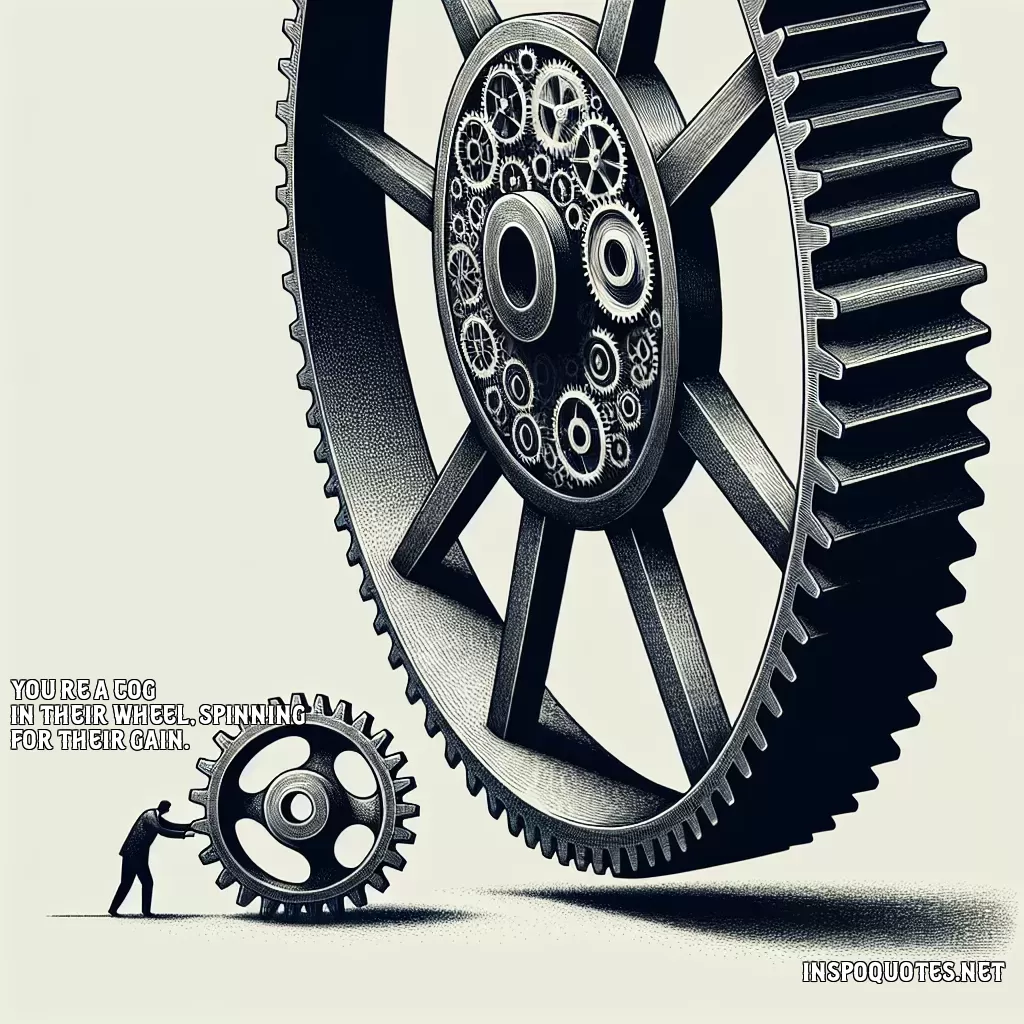
You’re a cog in their wheel, spinning for their gain.
Author: Theodore Roethke
👁️ 7 views
The quote "You’re a cog in their wheel, spinning for their gain" serves as a metaphor to highlight the often-unacknowledged role individuals play within larger systems, typically organizations or societal structures. The imagery of a "cog" and a "wheel" reflects the mechanistic nature of many institutions where each person is akin to a cog—one small, replaceable part in a complex machine. In this context, the cog (the individual) contributes to the functioning of the wheel (the larger system or organization). The phrase "spinning for their gain" emphasizes that while the individual’s work is crucial for the system’s operation, the ultimate benefit is reaped by those who control or own the system. This speaks to a dynamic often observed in workplaces where employees, despite their hard work and dedication, primarily serve the interests of the higher-ups or the company as a whole, rather than their own personal or professional growth. Moreover, this quote can be seen as a critique of how some organizations might undervalue the contributions of individuals, viewing them merely as components rather than as unique and valuable members with their own aspirations. It encourages reflection on how one’s efforts are aligned with personal goals and fair compensation. It might also prompt a reevaluation of current structures and practices in society or business, advocating for a more equitable distribution of rewards where the contributions of every "cog" are recognized and rewarded appropriately.
Quote By: Theodore Roethke
Theodore Roethke, born on May 25, 1908, in Saginaw, Michigan, was a prominent American poet known for his deep connection to nature and the exploration of the self. Growing up in a family that operated a nurseries business, Roethke's childhood experiences in the lush gardens significantly influenced his later work, infusing his poetry with an appreciation for the natural world. He attended the University of Michigan, where he earned a bachelor’s degree in 1929 and later a master’s degree in 1931. Roethke's academic environment played a vital role in shaping his poetic voice, as he drew inspiration from modernist influences and fellow poets.
Roethke’s career as a poet began to flourish in the 1940s, marked by the publication of his first major collection, "Open House," in 1941. This work, along with subsequent collections such as "The Lost Son" (1948) and "Words for the Wind" (1958), established Theodore Roethke as a voice of emotional intensity and psychological depth. His poetry often grappled with themes of nature, identity, and the human experience, marked by a distinctive use of rhythm and imagery. Roethke’s style blends the personal with the universal, revealing the complexities of existence and the subconscious.
Throughout his life, Theodore Roethke received numerous accolades for his contributions to literature. He was awarded the Pulitzer Prize for Poetry in 1954 for his collection "The Collected Poems of Theodore Roethke," solidifying his place in the American literary canon. Known for his teaching at various institutions, including the University of Washington, Roethke deeply influenced a generation of poets with his insistence on the emotional and sensory engagement in poetry.
Theodore Roethke passed away on August 30, 1963, but his lyrical explorations and philosophical insights continue to resonate with readers and writers alike. His legacy endures, not only through his celebrated works but also through the inspiration he has imparted to countless poets who seek to navigate the intricate relationship between humanity and the natural world.